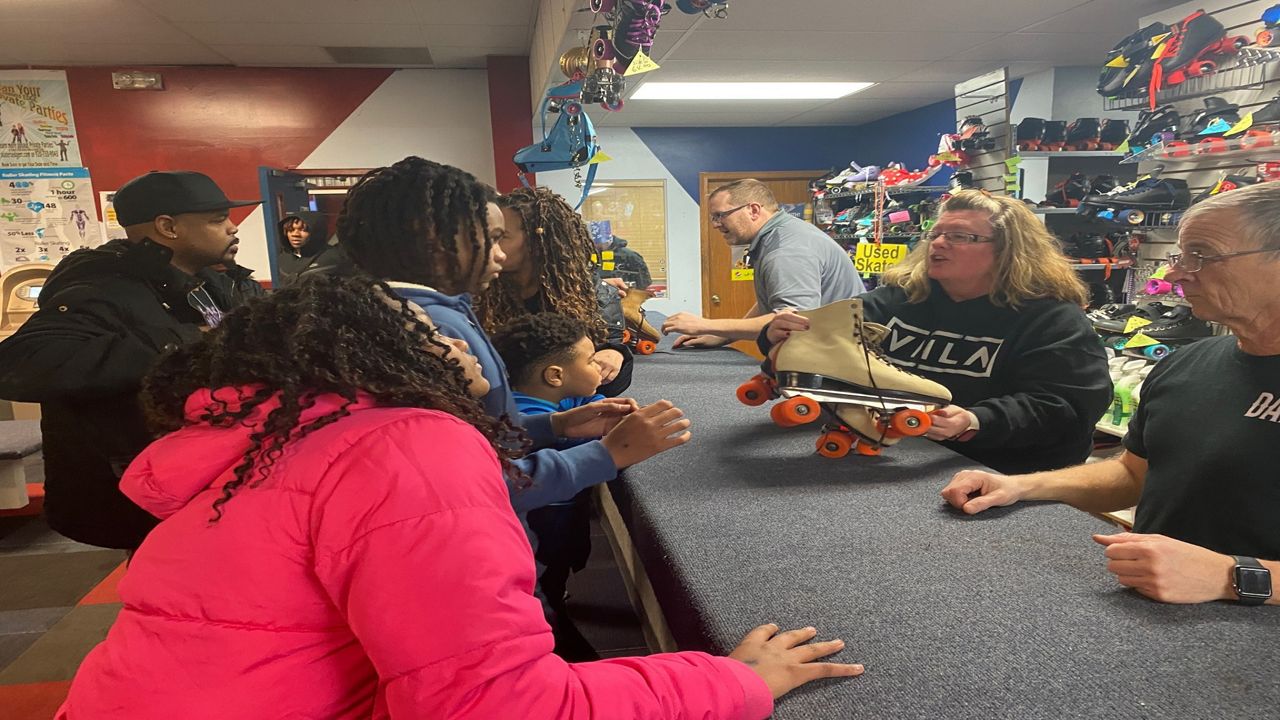APPLETON, Wis. — A pair of roller skates would probably not be the first thing you’d think of when advancing a lesson in American history.
But that was Kempton Freeman’s first thought. He knew the important role roller skating played in Black history during the civil rights movement. So he took that idea and rolled with it.
“I know how important, for the civil rights movement, having a place where we could just exist amongst each other and how important those spaces are,” said Freeman, the Cultural Advisor for the Appleton Area School District. “Whether they’re skating, whether it’s assemblies, whether it’s programming; it doesn’t really matter. But skating has just been so prevalent in Black culture since the 60s. So, I was wanting to make sure that I bring that in an inclusive way to the students, as well as the community."
“Like I tell people all the time, Black History Month is not just for Black people. It’s for everybody.”
Sunday night at Skaters Edge, Freeman and the Black, Indigenous and People of Color (BIPOC) Caucus at Appleton West hosted a “Soul Night” skating party to bring the ideas of community, inclusion, culture and education.
In the 1960s, roller skating was an outlet for Black people to skate freely and express themselves, offering a way to break free from the barriers of discrimination. In the 1950s, skating rinks were open to the Black community just one night a week. It was originally called “Black Night,” but during the 60s it was changed to “Martin Luther King Night” or “Soul Night.” But even on those nights, policies set forth discriminated against the Black community and its culture in terms of the clothing they could wear and music they could play.
The importance of skating during this time was further brought home by a man named Ledger Smith, who roller skated 685 miles to Washington, D.C., to hear Martin Luther King’s “I Have a Dream” speech.
“It’s just exciting to learn new things about your past and your culture,” said Ezra Brown, a senior at West and president of BIPOC. “To just be able to reconnect with people in a specific manner, whether it’s skating or anything.”
The appreciation of one’s culture is part of BIPOC’s mission, and the “Soul Night” roller skating event was designed to do just that.
“With BIPOC, it’s probably just connect people more,” said Brown. “And hope people realize the depths of culture, and how strong culture is and what it really means.”
Freeman grew up in St. Louis, a hotbed for roller skating. In his youth, he said skating rinks also provided a haven, a time when St. Louis ranked as the fourth-most dangerous city in the U.S. from 1990 to 1995.
“I want to go out and hang out with my friends, and so, if that’s the place where everybody came to …” Freeman said. “St. Louis in the 90s, you know how violent it was. And, if (a roller skating rink) is a safe space for us to be, I want to be in this space. Do you know what I’m saying?"
“If everybody else can go in there and be cool, I’m going to go there and be cool, too. So, like, that’s where, you know, ain’t nobody going to come into the place. Ain’t nobody coming in violent, ain’t nobody coming in and airing it out. So, that’s the place where we can come to have a good time. I want to be in this space with my friends.”
The idea of respecting those around you that share the same space is a message he’s trying to drive home.
“I tell people all the time, I don’t care too much about saying, ‘Where do you come from,’” said Freeman. “Who you are, what you believe, that doesn’t concern me. But at the end of the day, treat people with dignity and respect is super important. Treating people well is super important. We don’t all have to like each other. You don’t have to agree. We don’t have to be best friends. But at the end of the day, being in the space that you share, you have to have respect in that.”
And Freeman knows a roller skating rink is a good place to spread that idea.
“I never heard of a skate party since I’ve been here, and I’ve been here for 10 years,” he said. “So to bring something like that, I hope its something that we continue to do. As long as I’m an advisor for BIPOC, I want to make sure that we do inclusive stuff for the community as well along with the community service and the volunteering that we do. All those things tie in, but we can have fun along the way as well.”
Story idea? You can reach Mike Woods at 920-246-6321 or at: michael.t.woods1@charter.com



